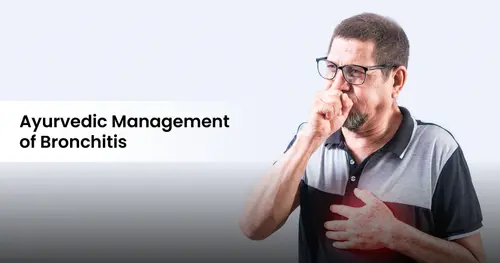
Tonsillitis, characterized by inflammation of the palatine tonsils, is a common upper respiratory condition most often triggered by viral or bacterial infections. Clinically, it presents with symptoms such as sore throat, odynophagia (painful swallowing), pyrexia, and visibly swollen or erythematous tonsils, sometimes with purulent exudates. While modern medicine commonly resorts to antibiotics or tonsillectomy in recurrent or resistant cases, Ayurveda offers a more integrative and constitutional approach, addressing not only symptomatic relief but also the underlying cause through doshic regulation, detoxification, and immune modulation.
In Ayurvedic nosology, tonsillitis is most closely aligned with the conditions known as Tundikeri or Kanthashaluka, both of which describe localized inflammatory afflictions of the throat region.
The tonsils, being composed of lymphoid tissue and involved in immunological surveillance, are functionally mapped to Rakta (blood) and Mamsa (muscle) dhatus. The pathogenesis involves vitiation of Kapha and Pitta doshas, often underpinned by Ama (endogenous toxins resulting from incomplete digestion) and Mandagni (weakened digestive/metabolic fire). Repeated exposure to etiological factors results in Srotorodha (channel obstruction) and local immune dysfunction, allowing pathogenic infiltration and inflammation.
Key precipitating factors include excessive consumption of cold, heavy, or oily foods; sudden exposure to cold and damp climates; and a weakened state of Ojas, the vital essence linked to immunity. Dietary indiscretions and stress-induced digestive impairment further perpetuate the cycle of Ama formation and immune vulnerability.
Clinical Presentation and Dosha Involvement
Tonsillitis manifests with sore throat, dysphagia, fatigue, malaise, low-grade fever, hoarseness, and sometimes a foul breath. Ayurvedically, the redness and inflammation are signs of Pitta vriddhi, while the swelling and mucus reflect Kapha dosha aggravation. A background of Vata imbalance may contribute to recurrent or chronicity of the condition due to tissue depletion and irregular immune response.
Ayurvedic Therapeutic Approach
Ayurvedic management emphasizes a multifactorial approach—correcting doshic imbalance, digesting Ama, enhancing local and systemic immunity, and preventing recurrence.
Dietary Regulation
A dosha-specific dietary protocol plays a critical role in tonsillitis management. Warm, light, and digestible meals like khichadi, vegetable broths, and steamed vegetables are encouraged to improve Agni and prevent Ama. The incorporation of anti-inflammatory and carminative spices such as turmeric, dry ginger, and black pepper helps pacify Kapha and Pitta while supporting digestion. Warm herbal teas made with Tulsi, ginger, or coriander not only soothe the throat but also exert mild antimicrobial and immunomodulatory actions.
Conversely, cold, heavy, and dairy-rich foods, as well as fermented, sour, or excessively spicy items, should be restricted. These can increase Kapha and Pitta and perpetuate inflammation. Excessive sugar, refined carbohydrates, and incompatible food combinations (Viruddha Ahara) are to be strictly avoided due to their propensity to generate Ama.
Herbal Interventions
A range of herbs with antimicrobial, anti-inflammatory, immunomodulatory, and Rasayana (rejuvenating) effects are employed in tonsillitis management. Tulsi (Ocimum sanctum) is known for its broad-spectrum antimicrobial and adaptogenic properties and can be taken as a decoction. Yashtimadhu (Glycyrrhiza glabra) is a potent demulcent that soothes inflamed mucosa and facilitates mucus expulsion. Haridra (Curcuma longa) in warm water or milk has systemic anti-inflammatory and wound-healing benefits.
Trikatu, a synergistic combination of ginger (Shunthi), black pepper (Maricha), and long pepper (Pippali), not only enhances bioavailability of other herbs but also mitigates Kapha and promotes Ama digestion. Sitopaladi Churna, a classical formulation, alleviates throat irritation and regulates Kapha-Pitta. Triphala, a tridosha-balancing combination of three fruits, detoxifies the GI tract, indirectly enhancing immune resilience.

Gargling and Local Therapies
Local therapies are essential in tonsillitis to directly target the oropharyngeal inflammation. Gargling with warm saline water infused with turmeric is a time-tested method for reducing bacterial load and soothing the inflamed mucosa. Decoctions of Triphala, Yashtimadhu, or Daruharidra serve as effective Kavala (gargles) due to their astringent, anti-inflammatory, and wound-healing properties.
Gandusha and Kavala with medicated oils such as Til Taila (sesame oil) or Coconut oil help strengthen the oral mucosa and provide a protective barrier against pathogens. Fresh ginger juice mixed with honey can be used both as a topical remedy and internal Prashamana for Kapha-Pitta pacification.
Internal Medications
Depending on the acute or chronic presentation, various internal medicines are chosen. These include Pippalyadi churna, Tejovatyadi churna, and Peetaka churna for digestive correction and Ama pachana. Vati preparations such as Yavagrajadi vatika, Panchkola gutika, and Kanchanara Guggulu are used for their anti-inflammatory and decongestant effects. Kwatha formulations like Patoladi Kwatha, Panchavalkala Kashaya, and Dashmoola Kwath provide systemic support through tissue detoxification and dosha balancing.
External Therapies and Panchakarma
In cases of chronic or recurrent tonsillitis, Panchakarma therapies like Vamana (therapeutic emesis) and Virechana (purgation) are indicated to expel vitiated Kapha and Pitta from the body. Nasya therapy with medicated oils like Anu Taila helps cleanse the upper respiratory tract and prevent further infections. Steam inhalation using decoctions of Tulsi, Ajwain, or Eucalyptus relieves congestion and soothes mucosal inflammation.
Lifestyle and Preventive Measures
A preventive strategy that enhances Ojas (immunity) and ensures throat health includes regular tongue scraping, oil pulling, seasonal adjustments in diet (Ritucharya), and adherence to Dinacharya (daily routine). Practices such as Pranayama, Yoga, and meditation enhance parasympathetic tone, reduce stress, and support immune competence. Avoiding excessive talking, loud speaking, or exposure to cold weather can also help minimize recurrence.
Hydration with warm fluids, sufficient sleep, and timely meals are simple but critical pillars in preventing the recurrence of tonsillitis, especially in individuals prone to Kapha-Pitta disorders.
Tonsillitis, though common, can become recurrent or chronic if not addressed holistically. Ayurveda offers a sustainable model of care by addressing the root causes, eliminating doshic imbalances, and strengthening systemic immunity. Through individualized interventions—comprising diet, herbal therapy, detoxification, and lifestyle correction—Ayurveda not only treats tonsillitis but also nurtures long-term oropharyngeal and systemic resilience.
FAQ
1. What is tonsillitis?
Tonsillitis is the inflammation of the palatine tonsils, often caused by viral or bacterial infections. Symptoms include sore throat, painful swallowing, fever, swollen tonsils, and sometimes pus.
2. Can Ayurvedic treatment be used with conventional medicine?
Yes, Ayurvedic treatments can be used alongside conventional medicine. Ayurvedic remedies focus on enhancing immunity, reducing inflammation, and supporting recovery, while antibiotics or pain relievers target the infection directly. Always consult your healthcare provider before combining treatments.
3. How can gargling help tonsillitis?
Gargling with warm saline water or herbal decoctions like Triphala or Yashtimadhu helps:
- Reduce bacterial load in the throat.
- Soothe inflamed mucous membranes.
- Provide antimicrobial and anti-inflammatory effects.
4. How long does it take for Ayurvedic treatments to show results?
For acute tonsillitis, Ayurvedic treatments can offer relief within a few days. For chronic or recurrent cases, it may take weeks to see significant improvement, particularly when combining dietary, herbal, and lifestyle changes.
5. How can I prevent tonsillitis in the future using Ayurveda?
Preventive strategies include:
- Boosting immunity with a balanced diet and herbs like Triphala and Tulsi.
- Avoiding dietary excesses like cold, heavy foods and sugary items.
- Practicing daily routines (Dinacharya) like tongue scraping, oil pulling, and regular sleep.
- Reducing stress through practices like Pranayama and Yoga to strengthen the body’s defense mechanisms.

September 25, 2025

September 15, 2025

September 11, 2025

August 22, 2025

August 13, 2025

August 13, 2025

August 08, 2025

August 06, 2025

July 28, 2025

July 21, 2025

July 17, 2025